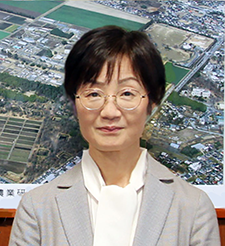
SHIBUYA Miki
On April 1, 2024, I was appointed as Director of Kyushu Okinawa Agricultural Research Center, NARO (KARC). I would like to take this opportunity to make a few remarks.
NARO entered its 5th Mid-term, which is for five years from April 2021. While the accumulation of agricultural land for farmers and the increase in exports, etc. continue, on the other hand labor shortages, climate change, and geopolitical risks are also increasing. Hence in this fifth term, there is a strong need to ensure food security and to make agriculture into a growth industry. To overcome these challenges faced by the agriculture and food industries, NARO, as a core research institute in Japan's agriculture and food industries, has the mission of creating scientific and technological innovations in the agriculture and food industries in line with policy requirements. Therefore our top priority is to realize the "Society 5.0" proposed by the government in the agriculture and food fields. Hence, NARO has set three organizational goals: 1) Increasing food self-sufficiency rate and ensuring food security, 2) Strengthening industrial competitiveness of agricultural products and food and expansion of exports and 3) Achieving both increased production and environment conservation. To achieve these goals, KARC is working to develop technologies that will strengthen the competitiveness of the local agricultural and food industries and to implement them in society.
In Kyushu and Okinawa, a wide variety of agricultural products are produced depending on the climate, location, and soil conditions of each region, including land-use crops such as rice, wheat, and soybeans, industrial crops such as tea and sugarcane, and livestock products such as beef cattle and dairy farming. Another characteristic of the region's agriculture is the high utilization rate of cultivated land, due to the warm, rainy climate, which allows for double cropping system such as growing wheat in rice paddies. Furthermore, as a food supply base, it boasts a production volume of 20% of the nation's agricultural output. As an export base to Asian countries where the market is growing rapidly, it has significantly increased the value of exports of strawberries, Wagyu beef, sweet potatoes, and other products.
Considering these characteristics, KARC is carrying out research aimed at "improving productivity and expanding exports of warm-climate agricultural and livestock products by making full use of farmland". Specifically, we are working on the following issues through the development of smart technologies that utilize AI and data: 1) Producing high-quality, low-cost Wagyu beef through seamless management from breeding to fattening, 2) Increasing yields and reducing fuel consumption in greenhouse vegetables through the suppression of damage caused by sweet potato root rot and data-driven precision management technology, 3) Realizing a highly profitable rice paddy rotation system that allows stable production by introducing seed corn, 4) Expanding the application of direct seeding cultivation technology for low-cost onion production. Based on these issues, we have been engaged in the development of high-level stable production technologies until last year such as development of measures to prevent root rot and spoilage during transportation for sweet potatoes, which is the main crop in southern Kyushu. Also for yield declination of soybeans, we have developed the new extremely high-yielding soybean variety "Sora minori", and a disk-type high-speed, one-step sowing technology that reduces the risk of moisture damage and allows for inexpensive, highly efficient sowing. In addition, to reduce the production costs and strengthen exports of Wagyu beef, we are promoting research and development aimed at reducing weather risks and making full use of farmland to improve productivity and expand exports. For this we are engaged in the development of APIs to predict the fertilizer effect of organic materials such as livestock manure compost and evaluating the resulting effect of reducing feed production costs.
This year marks the fourth year of the 5th Mid-term. In order to accelerate the dissemination of the technologies which we have developed so far, it will be important to quantitatively verify whether the developed technologies are helpful to achieve goals such as improving productivity and reducing costs at the agricultural sites and utilize this knowledge to improve the technology. Hence, we will work closely with those in the production field to strive to produce research results that will lead to increased agricultural income. We look forward to your continuous support and cooperation with our institute.
SHIBUYA Miki
Director
Kyushu Okinawa Agricultural Research Center, NARO





